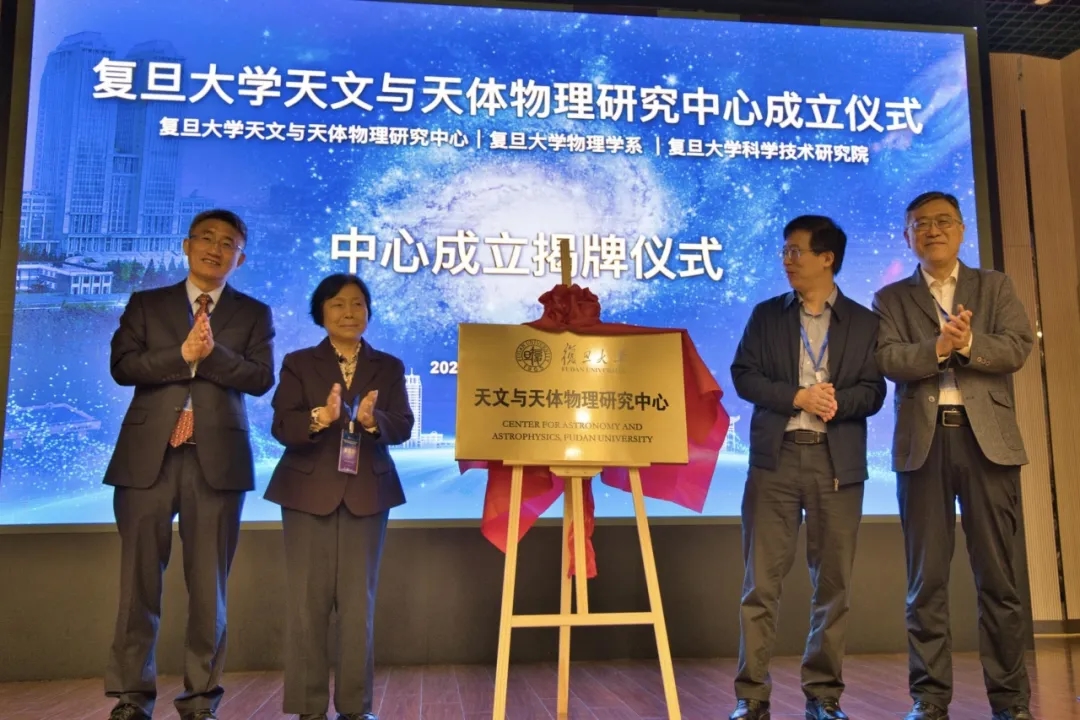On 13 October, Fudan University Center for Astronomy and Astrophysics (hereinafter referred to as CfAA) was inaugurated at Fudan University Jiangwan Campus. The center is established to improve the system of basic research disciplines of the university, meet the strategic needs of the country, and accelerate Fudan University march toward the forefront of world-class universities with Chinese characteristics.
Relying on the advantages of Fudan University's physics discipline, CfAA will take first-class and forefront as its goal, always take the lead of the development of Chinese astronomy, committed to promoting scientific research and talent training in astronomy, and cooperate with scholars at home and abroad to create high end scientific research results and train top-notch talents.
Ni Peigen, Deputy Director of the Mathematical & Physics Science Department of the National Natural Science Foundation of China, Cui Xiangqun, Academician from Nanjing Institute of Astronomical Optical Technology, Professor Zhou Lei, Vice President of Fudan University, and Professor Yuan Feng, Director of the Center for Astronomy and Astrophysics of Fudan University jointly inaugurated CfAA, academician Peng Huisheng, Dean of the Institute of Science and Technology of Fudan University, presided over the inauguration ceremony.

1.Optimizing the discipline layout: a new start for Fudan University in the field of astronomy
Astronomy is one of the bases in the layout of national disciplines and is the engine of basic disciplines development . Since 2017, three astrophysics related research was awarded by Nobel Prizes in physics and the level of astronomy innovation has become one of the criteria to assess the scientific and technological level of a country. In 2023, the Reform Plan for the Adjustment and Optimization of the professional setting of general higher education disciplines (《普通高等教育学科专业设置调整优化改革方案》) issued by the Ministry of Education and other five ministries and commissions emphasizing the need to strengthen basic disciplines such as mathematics, physics, chemistry, and biology, while appropriately expanding the layout of in-demand disciplines like astronomy.
The establishment of the Fudan University Center for Astronomy and Astrophysics marks a new starting point for research in the field of astronomy at Fudan University. CfAA will primarily focus on four key research areas: high-energy astrophysics, galaxy formation and evolution, cosmology, and computational astrophysics, while also considering research in time-domain astronomy and exoplanet formation. Research methods will include theoretical studies, numerical simulations, and observations. High-energy astrophysics encompasses black hole astrophysics (black hole accretion theory, active galactic nuclei, transient sources) and particle astrophysics; galaxy formation and evolution cover theories and observational studies related to active galactic nucleus feedback, particularly the increasingly popular theories and observational studies related to the circumgalactic medium; time-domain astronomy includes research directions such as gamma ray bursts, fast radio bursts, and the tidal disruption of stars by black holes.
2. Establishing an Internationally Influential and Domestically Leading Institution for Astronomy Research and Talent Development
In recent years, Fudan University has placed particular emphasis on the talent in the field of astrophysics and successfully attracting young talents such as Professors Cosimo Bambi and Antonino Marciano. In 2024, Professor Yuan Feng, a leading figure in the field of astronomy, joined Fudan University, which subsequently approved the establishment of the Center for Astronomy and Astrophysics. CfAA currently comprises four professors, one young researcher, two research assistants, five postdoctoral researchers, 22 graduate students, and 35 undergraduate students.
CfAA will continue to attract young and mid-career talents and prompt academic exchanges with astronomy research institutions worldwide, and foster interdisciplinary collaboration with related fields at Fudan University, including physics, mathematics, computer science, chemistry, and biology. CfAA plans to build a competent team of 8 to 10 researchers in astronomy and astrophysics within 2 to 3 years, meet the need to develop the discipline. Subsequently, it will focus on precise talent attraction and sustainable development, with the aim of establishing a higher-level, internationally influential, and domestically leading institution for astronomy research and talent cultivation within five years.
Over 40 invited experts from the astronomy community attended the inauguration ceremony, including Ni Peigen, Deputy Director of the Mathematical and Physical Sciences Division of the National Natural Science Foundation, He Cheng, Director of the Astronomy Division, Academician Jiang Song from the Beijing Institute of Applied Physics and Computational Mathematics, Academician Xie Xincheng from Fudan University, Academician Han Zhanwen from the Yunnan Observatory of the Chinese Academy of Sciences, Academician Gong Xinguo from Fudan University, Academician Lin Haiqing from Zhejiang University, Academician Shi Shengcai from the Purple Mountain Observatory of the Chinese Academy of Sciences, and Academician Zhao Gang from the National Astronomical Observatories of the Chinese Academy of Sciences.
After the inauguration ceremony, theattendees engaged in discussions regarding the development strategy of CfAA. Astronomy is a representative discipline that expands towards the extremely macroscopic, delves into the extremely microscopic, and synergizes across various fields. The experts provided insights on multiple aspects such as discipline development, scientific research, talent recruitment and training, and academic exchanges, expressing their wishes that CfAA becomes an internationally renowned top-tier research institution and talent training center.
